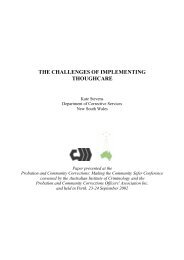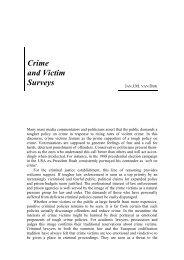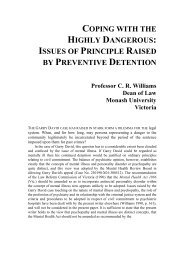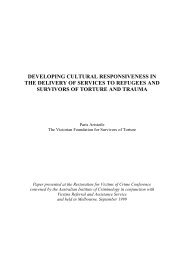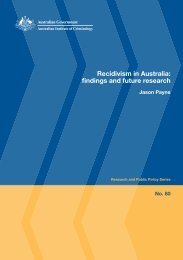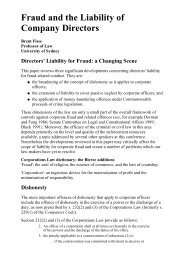Review of anti-corruption strategies Rob McCusker - Australian ...
Review of anti-corruption strategies Rob McCusker - Australian ...
Review of anti-corruption strategies Rob McCusker - Australian ...
You also want an ePaper? Increase the reach of your titles
YUMPU automatically turns print PDFs into web optimized ePapers that Google loves.
Uprooting graft 2005. The economist 28 April: 26<br />
This article notes the first verdict handed down by Indonesia’s new <strong>anti</strong>-<strong>corruption</strong> court in relation to the<br />
conviction <strong>of</strong> the governor <strong>of</strong> Aceh province, Abdullah Puteh, <strong>of</strong> taking 3.6 billion rupiah ($380,000) <strong>of</strong><br />
12.6 billion rupiah that had been allocated to buy a helicopter. Mr Puteh was imprisoned for ten years—<br />
two more than the prosecutors had demanded—and fined 500m rupiah.<br />
Villaroman N 2005. Laws and jurisprudence on graft and <strong>corruption</strong>: a compendium. Quezon City:<br />
Central Books<br />
This book contains a range <strong>of</strong> pertinent <strong>anti</strong>-<strong>corruption</strong> legislation including the Anti-Graft and Corrupt<br />
Practices Act, The Code <strong>of</strong> Conduct and Ethical Standards for Public Officials and Employees and the<br />
Forfeiture Law.<br />
Webb P 2005. The United Nations convention against <strong>corruption</strong>. Journal <strong>of</strong> international economic law<br />
8(1): 191–229<br />
This paper sets the context for the UN Convention against Corruption by considering the first wave <strong>of</strong><br />
<strong>anti</strong>-<strong>corruption</strong> initiatives that occurred at the regional level. It then assesses the significance <strong>of</strong> this new<br />
international convention by examining the negotiating process and the strategic positions <strong>of</strong> different<br />
countries. In particular, it analyses the four areas that generated the most controversy during the<br />
negotiations: asset recovery, private sector <strong>corruption</strong>, political <strong>corruption</strong>, and monitoring. Although the<br />
Convention contains many innovative provisions, the paper suggests that it also suffers from some basic<br />
weaknesses that may prevent it from having a real impact on corrupt behaviour.<br />
Wedeman A 2005. Anti<strong>corruption</strong> campaigns and the intensification <strong>of</strong> <strong>corruption</strong> in China. Journal <strong>of</strong><br />
contemporary China 14(42): 93–116<br />
This paper analyses the efficacy <strong>of</strong> China’s campaign-style <strong>anti</strong>-<strong>corruption</strong> strategy using a combination <strong>of</strong><br />
formal modelling and empirical data. The analysis suggests that while this sort <strong>of</strong> strategy may succeed in<br />
keeping <strong>corruption</strong> under control, it is likely to do so by deterring low-level <strong>corruption</strong>, but not high-level,<br />
high stakes <strong>corruption</strong>, and may encourage inflation <strong>of</strong> the size <strong>of</strong> bribes. The article thus concludes that<br />
campaign-style enforcement may have actually contributed to the intensification <strong>of</strong> <strong>corruption</strong>.<br />
Wu X 2005. Corporate governance and <strong>corruption</strong>: a cross-country analysis. Governance 18(2): 151–170<br />
This paper argues that corporate governance is among the important factors determining the level <strong>of</strong><br />
<strong>corruption</strong>. Using a cross-country data set, hypotheses that explicitly link various measures <strong>of</strong> corporate<br />
governance to the level <strong>of</strong> <strong>corruption</strong> are tested. The results show that corporate governance standards<br />
can have pr<strong>of</strong>ound impacts on the effectiveness <strong>of</strong> the global <strong>anti</strong>-<strong>corruption</strong> campaign.<br />
Yang D 2005. Integrity for hire: an analysis <strong>of</strong> a widespread program for combating customs <strong>corruption</strong>.<br />
Gerald R. Ford School <strong>of</strong> Public Policy and Department <strong>of</strong> Economics, University <strong>of</strong> Michigan.<br />
http://www.umich.edu/%7Edeanyang/papers/yang_psi.pdf<br />
Leadership data used in paper available at http://www.umich.edu/%7Edeanyang/papers/psi_leaderdata/<br />
psi_leaderdata.html<br />
This paper examines the impact <strong>of</strong> hiring private firms to collect information for government <strong>anti</strong><strong>corruption</strong><br />
efforts. In the past two decades, a number <strong>of</strong> developing countries have hired private firms<br />
to conduct pre-shipment inspections <strong>of</strong> imports, generating data that governments can use to fight<br />
<strong>corruption</strong> in customs agencies. The paper notes that countries implementing such inspection programs<br />
subsequently experience large increases in import duty collections. By contrast, the growth rate <strong>of</strong><br />
other tax revenues does not change appreciably. Additional evidence suggests that declines in customs<br />
<strong>corruption</strong> are behind the import duty improvements: the programs also lead to declines in undervaluation<br />
and in misreporting <strong>of</strong> goods classifications.





